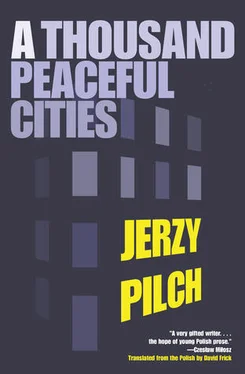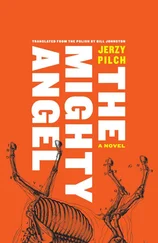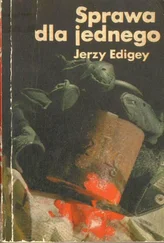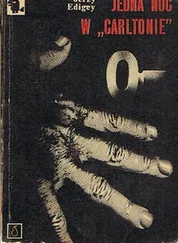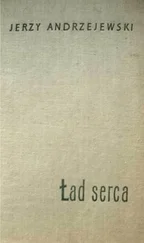Rain was falling harder and harder, and it seemed that not only the passersby, but even the architecture was scurrying away before us. Some sort of houses ran along on both sides, but almost nothing was visible. It was as if we were walking along some barely marked road through the rainy plains.
“And since we are talking about the esteemed Mrs. Chief, I remind you that we promised to dispatch a postcard. True, my bosom buddy from my student days, the most reverend Father Bishop, sends her postcards from around the world, but Warsaw is quite clearly missing from the collection.” Mr. Trąba squinted and looked, in vain, for a human dwelling in the absolute emptiness. He breathed in, searching for the smell of chimney smoke with his nostrils.
•
Indeed, the bishop did send postcards from around the world. Mostly he wrote from mythical lands in which there were only Protestants. From the panoramas I composed complete images of Stockholm, Copenhagen, and Helsinki. I knew the most secret corners of Geneva, corners that were unknown even to the native Swiss, by heart. If need be, I could check the time on the famous l’horloge fleurie . The water-hewn shape of the fantastic fountain on the shores of Lake Geneva had already bored me to death. Just like the Swiss stamps with their monumental Helvetia, Helvetia, Helvetia.
Mother didn’t allow me to unglue the stamps. To tell the truth, she didn’t like it when anyone touched the cards from the bishop. I got the impression that she didn’t even much like it when anyone looked at them. It often seemed that our very glances contained some sort of venomous, damaging powers. Once, Christ Almighty, I just couldn’t resist the temptation and unglued three stamps — they were as dazzling as the Pastor’s Wife’s complexion — from the postcard the bishop had sent from Tanzania! I couldn’t resist. I had to succumb. The skies on each of those stamps had a different color. On the first, negro shepherds tended cattle in grassy valleys, and the sky over them was orange. On the second, negro fishermen pulled nets full of fish out of the sea, and the sky over them was green. On the third, negro lumberjacks worked in the jungle, and dark-blue clouds floated just above their frizzy heads. I steamed those stamps loose. The bishop’s writing — he always wrote with a fountain pen — became blurred. All you could read was the sentence: “Yesterday I preached a sermon to a congregation that was as black as coal.” Mother cried. And then she hid the card I had mutilated somewhere. (She re-glued the stamps of the three skies with vegetable glue.)
I used to sneak in when she was away and open the chest. I would take out the little box — it smelled of rose oil and had once held Swiss Toblerone chocolates — in which she kept the postcards. I surveyed state after state, city after city — Edinburgh, Nairobi, Berlin, Athens, Amsterdam, Helsinki, America, England, Bulgaria, Sweden, Denmark. Tanzania was nowhere to be found. I would rummage through all the nooks of the chest. I soaked up the rose oil like a sponge. I even reached sacrilegiously into the pocket of her Sunday jacket. I opened her holiday purse. I surveyed page after page of Protestant Homiletics, Crumbs from the Lord’s Table , and other of the bishop’s writings — but the card with the three cloud-capped stamps had disappeared for all eternity.
•
From behind streams of rain loomed a Ruch kiosk filled with good things. The kiosk owner, with an unusually inhospitable facial expression, was the first person in this city who finally examined me attentively. To tell the truth, he didn’t let me out of his sight. He stared at me hatefully. Father bought The People’s Tribune and The Catholic Weekly . Mr. Trąba pondered which view of the Palace of Culture to choose. The kiosk owner stuck his head through the little window and shouted in an attack of insane fury:
“Carolers! St. Nicholases! Horned Beasts! People, the holidays aren’t until next month, and here they are already going about caroling! Hoofed devils! Winged angels!”
I was certain that Mr. Trąba would silence him with some world-class riposte, that he would extinguish the old fart with one well-aimed phrase, but suddenly Mr. Trąba’s hands started shaking. He was barely able to pay, barely able to hold the postcard in his hands. We walked off a few steps. You could still hear the sensational shouting of the kiosk owner. The rain lashed with redoubled force.
“You’re absolutely right, Chief.” Mr. Trąba, as pale as death, breathed heavily. He held himself up with his open palm on his heart. Or perhaps he was touching the protuberance, right at the height of his heart, that you could see through his autumn coat. In any case, one way or the other, he was propping himself up. “You’re absolutely right. Crises come. Doubts grow. The closer the hour of execution, the greater my hunger for alcohol. You’re absolutely right, and you foresaw all this well. The matter is, however, that I also foresaw this. Drinking, true drinking in anticipation of death, is an intensive course in self-knowledge, and I would truly be a pathetic fool if I hadn’t taken into account the following inevitable eventuality: that my shattered nervous system would go into complete disarray a few hours before the event and demand elemental consolation. And so, I repeat, that unforeseeable — although otherwise absolutely foreseeable — circumstance was carefully considered in my plans. Gentlemen, don’t look at me in such a panicked way. Talking soothes me. I haven’t gone completely mad at the last moment. Talking soothes me, and what is more, since I feel the irresistible desire to have a drink, I intend to assuage that desire by discoursing about drinking. Like it or not, you, Chief, and you, Jerzyk, will spend this afternoon listening to my comprehensive, definitive, and testamentary lecture on the artistry of form and the tragedy of content that is the art of drinking. And you will forgive me, gentlemen, but, in spite of the circumstances, I won’t invite you for this purpose to the mythical restaurant Kameralna. I invite you instead to the most exquisite, that’s right, the most exquisite confectioner’s shop in Eastern Europe. My treat. We’re near, it’s just two steps from here.”
And in a few minutes we crossed the threshold of the most exquisite confectioner’s shop in Eastern Europe, and we left our wet raincoats and the Chinese crossbow and arrow in the coat check room (the distinguished coat check attendant didn’t even bat an eyelid), and we sat down at a little table in a cozy bay window, and the most beautiful waitress in Eastern Europe, perhaps the most beautiful waitress in the world, brought us coffee, lemon squash, and cream pastries time and again, right up until the evening.
If I say that since that afternoon, since that rainy afternoon, when we whiled away the final hours before killing Gomułka by consuming monstrous quantities of cream pastries, washing it down with coffee and lemon squash, in short, if I say that from that time, my organism harbors a sort of animosity toward cream pastries, if I say this — it won’t be a surprise. And so, I will say this: in spite of the fact that I am a greedy glutton for every kind of gumdrop, in spite of the fact that I can’t imagine an evening without a bar of milk chocolate, in spite of the fact that, for a middle-aged person, I nourish an excessive cult of the sweet, in spite of the fact that, for a man who, with the fierce shamelessness of the forty-something, now, in the middle of the nineties, still chases after angels who have been freed from the Muscovite yoke, in spite of the fact that I am able, with simply unmanly greediness, to gorge on sweets of every shape and color — to this day I won’t touch a cream pastry.
Читать дальше
